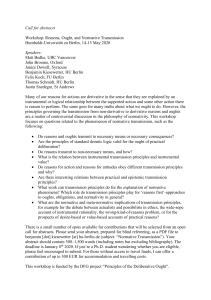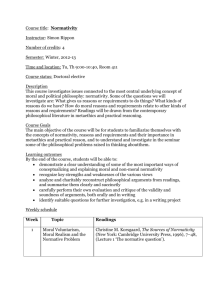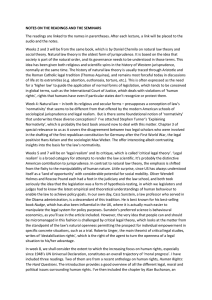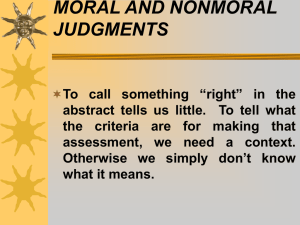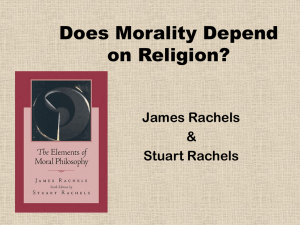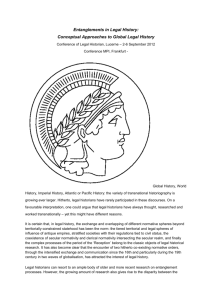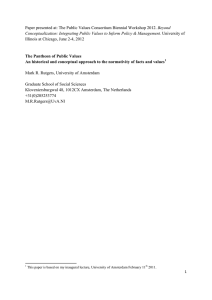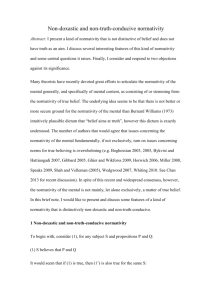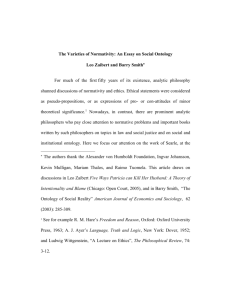PHIL540 DESCRIPTION, SPRING `07
advertisement
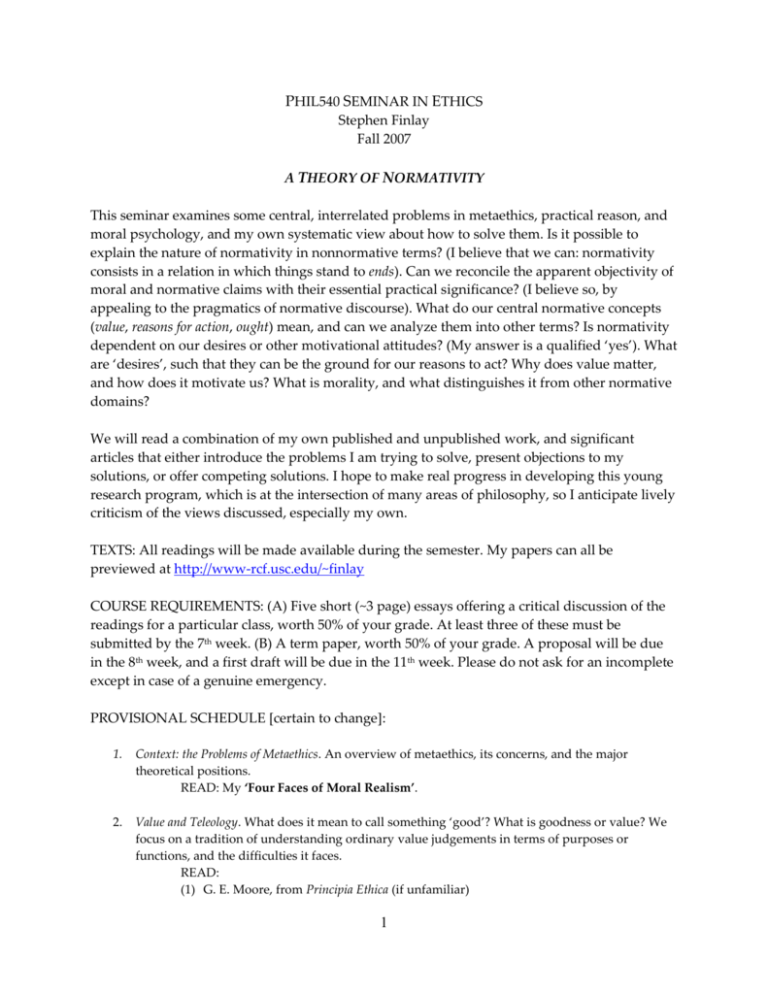
PHIL540 SEMINAR IN ETHICS Stephen Finlay Fall 2007 A THEORY OF NORMATIVITY This seminar examines some central, interrelated problems in metaethics, practical reason, and moral psychology, and my own systematic view about how to solve them. Is it possible to explain the nature of normativity in nonnormative terms? (I believe that we can: normativity consists in a relation in which things stand to ends). Can we reconcile the apparent objectivity of moral and normative claims with their essential practical significance? (I believe so, by appealing to the pragmatics of normative discourse). What do our central normative concepts (value, reasons for action, ought) mean, and can we analyze them into other terms? Is normativity dependent on our desires or other motivational attitudes? (My answer is a qualified ‘yes’). What are ‘desires’, such that they can be the ground for our reasons to act? Why does value matter, and how does it motivate us? What is morality, and what distinguishes it from other normative domains? We will read a combination of my own published and unpublished work, and significant articles that either introduce the problems I am trying to solve, present objections to my solutions, or offer competing solutions. I hope to make real progress in developing this young research program, which is at the intersection of many areas of philosophy, so I anticipate lively criticism of the views discussed, especially my own. TEXTS: All readings will be made available during the semester. My papers can all be previewed at http://www-rcf.usc.edu/~finlay COURSE REQUIREMENTS: (A) Five short (~3 page) essays offering a critical discussion of the readings for a particular class, worth 50% of your grade. At least three of these must be submitted by the 7th week. (B) A term paper, worth 50% of your grade. A proposal will be due in the 8th week, and a first draft will be due in the 11th week. Please do not ask for an incomplete except in case of a genuine emergency. PROVISIONAL SCHEDULE [certain to change]: 1. Context: the Problems of Metaethics. An overview of metaethics, its concerns, and the major theoretical positions. READ: My ‘Four Faces of Moral Realism’. 2. Value and Teleology. What does it mean to call something ‘good’? What is goodness or value? We focus on a tradition of understanding ordinary value judgements in terms of purposes or functions, and the difficulties it faces. READ: (1) G. E. Moore, from Principia Ethica (if unfamiliar) 1 (2) J.L. Mackie, ch. 2 of Ethics: Inventing Right and Wrong (3) Zoltan Szabo, ‘Adjectives in Context’, pp. 14-30. (4) Ludwig Wittgenstein, ‘Lecture on Ethics’ FURTHER READING: Gilbert Harman & Judith Thomson, Moral Relativism and Moral Objectivity, chs. 1 & 8; Paul Ziff, Semantic Analysis, ch. 6; Peter Geach, ‘Good and Evil’; Charles Stevenson, ‘The Emotive Meanings of Ethical Terms’; Philippa Foot, Natural Goodness, chs. 2 & 3, G. H. von Wright, Varieties of Goodness. 3. The Practicality of Value Judgement. Value judgement is alleged to have a special connection with motivation. How strong is this connection? Expressivists argue that it follows that value judgements cannot be beliefs. I propose that we can explain the connection between beliefs about value and motivation by looking to the pragmatics of normative discourse, and the phenomenon of conversational implicature. READ: (1) Michael Smith, The Moral Problem, ch. 1 (2) Allan Gibbard, Thinking How to Live, ch. 1. (3) P. Grice, ‘Logic and Conversation’ (4) My ‘The Conversational Practicality of Value Judgment’ FURTHER READING: Allan Gibbard, Wise Choices, Apt Feelings; Simon Blackburn, Ruling Passions; J. L. Mackie, Ethics: Inventing Right and Wrong, ch. 1; Smith, The Moral Problem, chs 2-3, 6. 4. Practicality continued: Conventional or Conversational? There are a variety of competing proposals about how to reconcile the cognitive (belief-like) nature of value judgement with its practicality. We critically compare several of these. READ: (1) David Copp ‘Realist-Expressivism’ (2) Stephen Barker ‘Is Value Content a Component of Conventional Implicature?’ (3) My ‘Value and Implicature’ (4) Matthew Chrisman & Dorit Bar-On, ‘Neo-Expressivism’ 5. Defining ‘Ought’. What does ‘ought’ mean? What is normativity? Examination of some prominent views, and my own analysis. READ: (1) Allan Gibbard, from Thinking How to Live (2) Judith Jarvis Thomson, ‘Normativity’ (3) My ‘Oughts and Ends’ FURTHER READING: Kai von Fintel & Sabine Iatridou, ?; R. M. Hare, The Language of Morals; Ralph Wedgwood, ‘The Meaning of Ought’; 6. The Detaching Problem. Some conditionals with ‘ought’ consequents, including the instrumental principle, seem to disallow detaching their consequents, in violation of modus ponens. We examine some of the literature on this puzzle, and how my own analysis of ‘ought’ solves it. READ: (1) Christine Korsgaard, ‘The Normativity of Instrumental Reason’ 2 (2) John Broome, ‘Normative Requirements’ (3) Niko Kolodny, from ‘Why Be Rational?’ (4) My ‘What Ought Probably Means’ 7. Internal vs. External Reasons. Do our reasons to act depend on what we desire? We face a dilemma; if we say ‘yes,’ we seem to have to deny that people always have reasons to act as they morally ought. If we say ‘no’, it’s hard to see what we could mean by a ‘reason to act’. We examine my proposed solution to this dilemma. READ: (1) Bernard Williams, ‘Internal and External Reasons’ (2) Derek Parfit, ‘Reason and Motivation’ (3) My ‘The Reasons that Matter’ 8. Desire and Normative Authority. Some philosophers argue that our desires might be based on our reasons, rather than vice versa. We examine some of these proposals, and my own argument that the voluntary character of responses to normativity entails that these philosophers have it the wrong way around. READ: (1) Stephen Darwall, from Impartial Reason (2) Thomas Nagel, from The Possibility of Altruism (3) R. Jay Wallace, ‘Three Conceptions of Agency’ (4) My ‘Responding to Normativity’ 9. Instrumental Reason. Are there desire-independent rational norms? Some philosophers argue that even if we accept the instrumental principle that we ought to adopt the means to our ends, we are already committed to there being at least one desire-independent norm. We examine this argument, and my own view that we should reject the instrumental principle as not genuinely normative. READ: (1) Thomas Nagel, from The Possibility of Altruism (2) Christine Korsgaard, ‘The Normativity of Instrumental Reason’ (3) My ‘Against All Reason? Skepticism about the Instrumental Norm’. FURTHER READING: Joseph Raz, ‘The Myth of Instrumental Rationality’; Niko Kolodny, ‘Why Be Rational?’; Mark Schroeder, ‘The Hypothetical Imperative?’; Kieran Setiya, ‘Cognitivism about Instrumental Reason’. 10. Desire and Motivation. The role of desire in motivation. Can desire motivate action without the assistance of a substantive faculty of practical reason? Some philosophers argue that desire has little motivational power at all. READ: (1) Jonathan Dancy, from Practical Reality (2) My ‘Motivation to the Means’. 11. The Nature of Desire. What is ‘desire’, anyway, and how is it possible for a ‘mere psychological state’ to be the foundation of normativity? We examine a variety of views. READ: (1) Michael Smith, The Moral Problem, ch. 4. 3 (2) Dennis Stampe, ‘The Authority of Desire’ (3) Jonathan Dancy, from Practical Reality (4) My ‘What is Desiring?’ FURTHER READING: Tim Schroeder, Three Faces of Desire; T. M. Scanlon, from What We Owe to Each Other; 12. The Content & Authority of Morality. The moral is a special realm of the normative, but what distinguishes it? Morality has a characteristic content, and a characteristic force; we examine how each should be interpreted, and how morality fits within the theory of normativity presented in this course. READ: (1) Samuel Scheffler, from Human Morality (2) My ‘Too Much Morality’. 13. Against Moral Skepticism. Error theorists claim that because the characteristic features of morality aren’t to be found in the real world, moral claims are systematically false. We examine my diagnosis of where their arguments go wrong. READ: (1) Joyce, from The Myth of Morality (2) My ‘The Error in the Error Theory’. 4
